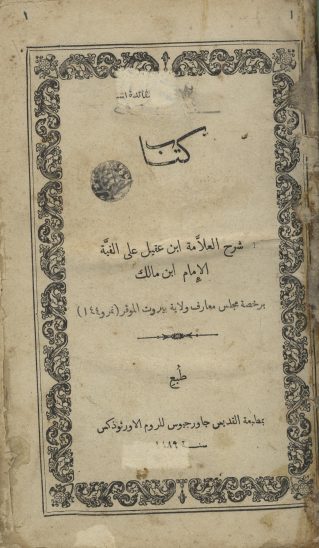Sharh al-Allama Ibn Aqil ala Alfiyat al-Imam Ibn Malik. شرح العلامة ابن عقيل على ألفية الإمام ابن مالك
Ibn ‘Aqil, abu al-Wafa ‘Ali.
Synopsis
Abu al-Wafa Ali Ibn Aqil ibn Ahmad al-Baghdadi (1040–1119) was an Islamic theologian from Baghdad. He was a Hanbali jurist with rationalist leanings and trained in the tenets of the Hanbali school (mazhab). He was forced into hiding by the Hanbalis for frequenting the circles of groups who were at odds with the Hanbali tradition. In one of his reminiscences, he remarks that his Hanbali companions wanted him to abandon the company of certain scholars, and complains that it hindered him from acquiring useful knowledge. In traditionalist eleventh-century Baghdad, his admiration for the mystic al-Hallaj (d. 922 ) led to his persecution and forced him to recant. Among his works of jurisprudence that have survived is al-Wadih fi Usul al-Fiqh.
This work is a commentary by Ibn ‘Aqīl on the famous 1,000-line poem on the principles of Arabic grammar, al-Alfīya by Ibn Malik. Ibn ‘Aqil (1040-1119) was a leading grammarian of the Arabic language and wrote prolifically, but not much is known about his life. In addition to his commentary on al-Alfiya, his works include Taysīr al-Isti‘dād li Rutbat al- Ijtihād (The facility of preparedness for the capacity of independent reasoning) and al-Jāmi‘al-Nafīs ‘Alā Mazhab al-Imām Muhammad Ibn Idrīs (The precious encyclopaedia on the method of the Imam
Muhammad ibn Idrīs, in six volumes). Both al-Alfiya and the commentary are standard texts in the traditional Islamic curriculum. Muhammad ibn ‘Abd Allāh ibn Malik (died 1274) was an Arab grammarian born in Jaén in Andalusia. After leaving Andalusia he settled in Syria. He is best known for his al-Khulāsa al-Afīya (or al-Alfiya for short), a versification of Arabic grammar that was to become one of the principal texts for education in the Arabic language across much of the Islamic world. At least 43 commentaries have been written on this work, which is so important because scholars had previously searched for dependable authentication of the grammar and lexicon of Arabic. Ibn Malik intended his poem as a teaching tool rather than a work of research. However, students were required to memorize it, which became controversial in modern times.






